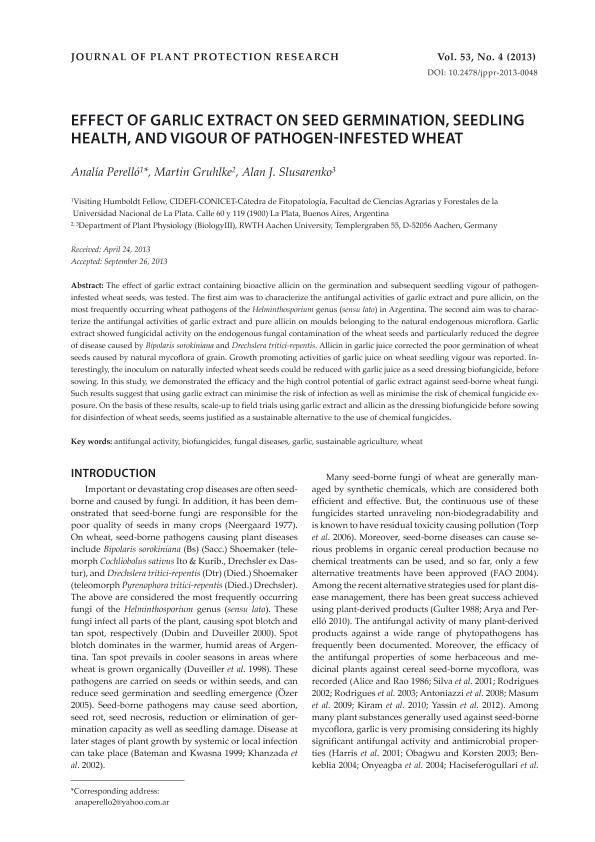Mostrar el registro sencillo del ítem
dc.contributor.author
Perello, Analia Edith

dc.contributor.author
Gruhlke, Martin
dc.contributor.author
Slusarenko, Alan J.
dc.date.available
2017-03-13T21:06:02Z
dc.date.issued
2013-10
dc.identifier.citation
Perello, Analia Edith; Gruhlke, Martin; Slusarenko, Alan J.; Effect of garlic extract on seed germination, seedling health, and vigour of pathogen-infested wheat; De Gruyter; Journal of Plant Protection Research; 53; 4; 10-2013; 317-323
dc.identifier.issn
1427-4345
dc.identifier.uri
http://hdl.handle.net/11336/13810
dc.description.abstract
The effect of garlic extract containing bioactive allicin on the germination and subsequent seedling vigour of pathogeninfested wheat seeds, was tested. The first aim was to characterize the antifungal activities of garlic extract and pure allicin, on the most frequently occurring wheat pathogens of the Helminthosporium genus (sensu lato) in Argentina. The second aim was to characterize the antifungal activities of garlic extract and pure allicin on moulds belonging to the natural endogenous microflora. Garlic extract showed fungicidal activity on the endogenous fungal contamination of the wheat seeds and particularly reduced the degree of disease caused by Bipolaris sorokiniana and Drechslera tritici-repentis. Allicin in garlic juice corrected the poor germination of wheat seeds caused by natural mycoflora of grain. Growth promoting activities of garlic juice on wheat seedling vigour was reported. Interestingly, the inoculum on naturally infected wheat seeds could be reduced with garlic juice as a seed dressing biofungicide, before sowing. In this study, we demonstrated the efficacy and the high control potential of garlic extract against seed-borne wheat fungi. Such results suggest that using garlic extract can minimise the risk of infection as well as minimise the risk of chemical fungicide exposure. On the basis of these results, scale-up to field trials using garlic extract and allicin as the dressing biofungicide before sowing for disinfection of wheat seeds, seems justified as a sustainable alternative to the use of chemical fungicides.
dc.format
application/pdf
dc.language.iso
eng
dc.publisher
De Gruyter

dc.rights
info:eu-repo/semantics/openAccess
dc.rights.uri
https://creativecommons.org/licenses/by-nc-sa/2.5/ar/
dc.subject
ANTIFUNGAL ACTIVITY
dc.subject
BIOFUNGICIDES
dc.subject
FUNGAL DISEASES
dc.subject
GARLIC
dc.subject
SUSTAINABLE AGRICULTURE
dc.subject
WHEAT
dc.subject.classification
Otras Ciencias de la Tierra y relacionadas con el Medio Ambiente

dc.subject.classification
Ciencias de la Tierra y relacionadas con el Medio Ambiente

dc.subject.classification
CIENCIAS NATURALES Y EXACTAS

dc.title
Effect of garlic extract on seed germination, seedling health, and vigour of pathogen-infested wheat
dc.type
info:eu-repo/semantics/article
dc.type
info:ar-repo/semantics/artículo
dc.type
info:eu-repo/semantics/publishedVersion
dc.date.updated
2017-03-13T16:00:31Z
dc.identifier.eissn
1899-007X
dc.journal.volume
53
dc.journal.number
4
dc.journal.pagination
317-323
dc.journal.pais
Alemania

dc.journal.ciudad
Berlin
dc.description.fil
Fil: Perello, Analia Edith. Universidad Nacional de La Plata. Facultad de Ciencias Agrarias y Forestales. Departamento de Ciencias Biológicas. Centro en Investigación de Fitopatología; Argentina. Consejo Nacional de Investigaciones Científicas y Técnicas; Argentina
dc.description.fil
Fil: Gruhlke, Martin. Rwth University University; Alemania
dc.description.fil
Fil: Slusarenko, Alan J.. Rwth University University; Alemania
dc.journal.title
Journal of Plant Protection Research
dc.relation.alternativeid
info:eu-repo/semantics/altIdentifier/doi/http://dx.doi.org/10.2478/jppr-2013-0048
dc.relation.alternativeid
info:eu-repo/semantics/altIdentifier/url/https://www.degruyter.com/view/j/jppr.2013.53.issue-4/jppr-2013-0048/jppr-2013-0048.xml
Archivos asociados
